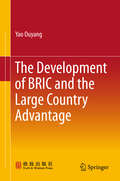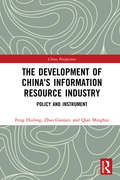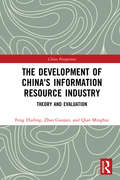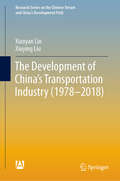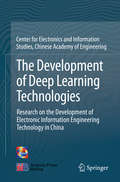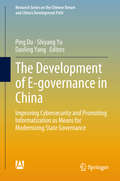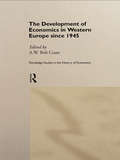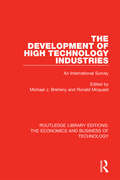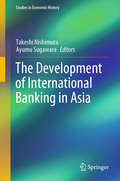- Table View
- List View
The Development of African Capital Markets: A Legal and Institutional Approach (Routledge Contemporary Africa)
by Boniface ChimpangoMost capital markets that have been established in developing economies like Africa have struggled to make progress over two decades down the line. Development of African Capital Markets explores why these markets have remained underdeveloped and discusses a possible development theory that can be used in designing and implementing legal and institutional reforms to reinvigorate capital markets in African and other developing countries. Boniface Chimpango analyses the weaknesses of capital markets in developing countries, and argues that legal and institutional framework for capital markets in developing countries should be tailored to the unique informal rules prevalent in each country rather than being transplanted from developed countries. This book will be of interest to scholars, students and policy makers in the fields of economic development, African Studies, law, development and regulatory policy.
The Development of American Finance
by Martijn KoningsSince the 1960s, scholars and other commentators have frequently announced the imminent decline of American financial power: excessive speculation and debt are believed to have undermined the long-term basis of a stable U.S.-led financial order. But the American financial system has repeatedly shown itself to be more resilient than such assessments suggest. This book argues that there is considerable coherence to American finance: far from being a house of cards, it is a proper edifice, built on institutional foundations with points of both strength and weakness. The book examines these foundations through a historical account of their construction: it shows how institutional transformations in the late nineteenth century created a distinctive infrastructure of financial relations and proceeds to trace the contradiction-ridden expansion of this system during the twentieth century as well as its institutional consolidation during the neoliberal era. It concludes with a discussion of the forces of instability that hit at the start of the twenty-first century.
The Development of BRIC and the Large Country Advantage
by Yao OuyangThis book explores key questions concerning the reasons for China s economic miracle and the rise of BRICs. It develops the concept of the Comprehensive Advantages of Large Countries (CAOLCs) and reveals the formation mechanism of CAOLCs. By analyzing the rapid rise of BRICs and the large economy phenomena, the book emphasizes the crucial role that BRICs played during and after the global financial crisis. Readers are offered important information on how China is coping with the huge impact of the financial crisis and how it is seizing the opportunity to adjust and optimize its industrial structure in the post-crisis era. "
The Development of British Industry and Foreign Competition: 1875-1914 (Routledge Revivals)
by Derek H. AldcroftOriginally published in 1968 this important work covers a crucial period in Britain’s economic history. In the three or four decades before the First World War British industry was subject to increasing foreign competition particularly from America and Germany. This book reviews the main developments in 10 industries, paying particular attention to the way in which they were affected by foreign competition, and the measures taken to combat it. Each case is analysed in terms of how progressive the British industrialists were and to what extent they were willing to innovate or alter their methods to meet the new conditions. In cases where a lack of enterprise was clear, the contributors have tried to determine what the major factors were which governed the pace of innovation. The book will be of interest to economists, economic historians and sociologists as well as those interested in industrial innovation.
The Development of Capitalism in Africa (Routledge Library Editions: Development)
by Sheila Smith John SenderFirst published in 1986, this work challenges underdevelopment analyses of Africa’s past experiences and future prospects, and builds upon a very wide range of recent historical research to argue that the impact of Capitalism has resulted in economic progress and significant improvements in living standards. In marked contrast to the dependency approach, they propose that the important political and economic differences between the experiences of developing countries should be stressed and analysed. The argument is supported by a detailed look at the emergence since 1900 of capitalist social relations of production in nine different countries.
The Development of Capitalism in Russia (Routledge Contemporary Russia and Eastern Europe Series)
by Simon ClarkeThis book provides a broad and comprehensive survey of the development of capitalism in Russia from the collapse of the Soviet economic system to the present, and includes the results of substantial new research on the current state of a wide range of Russian enterprises. Simon Clarke – a well-known authority in this area: surveys the old Soviet system charts the progress through the early post-Soviet period, when neo-liberal theorists’ ‘shock therapy’ did not lead to the immediate development of a capitalist market economy, and traditional enterprises became hugely loss-making considers the crisis of 1998, and its effects, which included the curtailment of speculation, and growing investment in the old industrial sector, which in turn put the new small and medium sized enterprises under increasing pressure discusses the wider theoretical implications of the Russian experience for other transitional economies.
The Development of China's Information Resource Industry: Policy and Instrument (China Perspectives)
by Huiling Feng Guojun Zhao Minghui QianAs an emerging strategic industry in China, the information resource industry (IRI) has had and will continue to have a growing impact on economic and social development. Focusing on the special characteristics of IRI policies in China, this book provides an in-depth discussion of the major directions, methods, and paths of development for IRI policies via a comprehensive analysis of the structural, organizational, promotional policies and policy instruments of China’s IRI. Concentrating on policy instruments, this book, for the first time, provides a systematic, well-rounded review of China’s IRI policies that have been released to date, and proposes a “China Information Resource Industry Policy Library” comprising six types of IRI policy documents: organizational, information, regulatory, incentives, market, and social. The whole contributes to a comprehensive understanding of the application of various IRI policies in China and also supports the building of industrial policies and the decision-making behind them.
The Development of China's Information Resource Industry: Theory and Evaluation (China Perspectives)
by Huiling Feng Guojun Zhao Minghui QianThe industrialization of information resources has been a growing trend across the world in recent years, especially in China, where the information resource industry has expanded exponentially for more than a decade. While analyzing the development conditions of China's information resource industry, this book clearly defines the implications and strategic value of the industry, summarizes basic information resource industry theories, and clarifies the history of its development and special regional characteristics within the Chinese context. Drawing on the statistics and measurement of various economic indicators of the information resource industry, the authors propose four stages of development: a germination period, an initial development period, a subsequent rapid development period, and lastly, a steady development period. At the same time, the book draws upon various theoretical models such as the "Dynamic Resource Triangle" model, the "Information Resource Industrial Symbiosis" model, the value chain model, and the explanation model of information consumption in order to shed light on the information resource industry's elements and the optimization of its management. In addition, the authors present the Information Resource Industry Development Index (IRIDI) to evaluate the industry’s development in different provinces and cities across mainland China and monitor its dynamics from the point of view of industrial value and the external environment. While the book lays a solid theoretical foundation for the growth of China’s information resource industry, it will also give international readers a clear picture of China's emerging industries in the current era.
The Development of China's Transportation Industry (Research Series on the Chinese Dream and China’s Development Path)
by Xiaoyan Lin Xiuying LiuThis book provides a detailed introduction to the history and development of China's railways, highways, civil aviation, shipping, inland water transportation, tourism transportation, and coal transportation since the reform and opening up 40 years ago. With the development of transportation technology, the Internet, and e-commerce, China's transportation intelligence, green technology, environmental protection, and network level have continued to improve. This book details the achievements of China's transportation industry and how it effectively promotes and supports China's economic growth. It proposes continuing to rapidly promote the construction of infrastructure such as high-speed railways, highways, bridges, ports, and airports.
The Development of Cities in Northern and Central Italy: During the Renaissance (Routledge Revivals)
by Paul N. BalchinOriginally published in 2019, this book provides a comprehensive account of a formative historical period, uniquely describing Renaissance architecture as the physical manifestation of political and economic change. The book illustrates how shifts in architectural style and design were paralleled with Northern and Central Italy’s external and internal conflicts, the evolution of urban and regional government, and economic and demographic growth. Covering the full extent of the Renaissance period, Balchin charts the era’s medieval roots and its transformation into Mannerist and Baroque tendencies. He demonstrates how developments in architecture and planning were inextricably linked to political and economic power, and how these relationships shifted from city to city over time.
The Development of Component-based Information Systems (Advances In Management Information Systems Ser.)
by Sergio de Cesare Mark Geoffrey Lycett Robert MacredieThis work provides a comprehensive overview of research and practical issues relating to component-based development information systems (CBIS). Spanning the organizational, developmental, and technical aspects of the subject, the original research included here provides fresh insights into successful CBIS technology and application. Part I covers component-based development methodologies and system architectures. Part II analyzes different aspects of managing component-based development. Part III investigates component-based development versus commercial off-the-shelf products (COTS), including the selection and trading of COTS products.
The Development of Consumer Credit in Global Perspective
by Jan LogemannThis volume brings together historians, economists, political scientists, and anthropologists to present a global perspective on the new forms of lending and borrowing that have become a key feature of twentieth-century mass consumer societies, emphasizing comparative and transnational historical perspectives.
The Development of Corporate Governance in Japan and Britain (Explorations In Asia Pacific Business Economics Ser.)
by Etsuo AbeThe topic of 'corporate governance' attracts the interest of commentators, policy makers and academics due to its focus on major differences between national business systems and their performance. Yet many works engage in generalizations, and fail to appreciate the realities and circumstances of its long-term evolution. Comparative study is used in this book to analyse national, legal, cultural and industry-specific contexts and the broad range of key factors contributing to the emergence of business institutions. Historical insight into the origins of corporate governance systems and the impact of institutional legacy is used to unravel development pathways in Japan and Britain. The book is the result of genuine international cooperation between established Japanese and British business historians and management academics.
The Development of Deep Learning Technologies: Research on the Development of Electronic Information Engineering Technology in China
by Chinese Academy of EngineeringThis book is a part of the Blue Book series “Research on the Development of Electronic Information Engineering Technology in China,” which explores the cutting edge of deep learning studies. A subfield of machine learning, deep learning differs from conventional machine learning methods in its ability to learn multiple levels of representation and abstraction by using several layers of nonlinear modules for feature extraction and transformation. The extensive use and huge success of deep learning in speech, CV, and NLP have led to significant advances toward the full materialization of AI. Focusing on the development of deep learning technologies, this book also discusses global trends, the status of deep learning development in China and the future of deep learning.
The Development of Double Entry: Selected Essays (Routledge Library Editions: Accounting)
by Christopher NobesThis compilation concerns account books, not books on accounting. Most of the essays analyse the account book(s) of a single person or business. In each case the account book(s) demonstrate the presence of, at least, elements of double entry. The essays come in pairs, beginning with Geoffrey Lee’s paper on Florentine bank ledger fragments of 1211, some of the earliest relics of Italian bookkeeping. Subsequent papers trace the development of double entry over the centuries until 1786 when full double entry was achieved. There are papers from the UK and USA which illustrate the use of balance sheets, valuation techniques and the accruals convention as well as papers which analyse the causes of the development of double entry, using the evidence of others.
The Development of E-governance in China: Improving Cybersecurity and Promoting Informatization as Means for Modernizing State Governance (Research Series on the Chinese Dream and China’s Development Path)
by Ping Du Shiyang Yu Daoling YangThis book figures out that network security and informatization have entered a development stage of greater permeation and deeper integration into all aspects of the economy and society. In particular since the 2008 financial crisis, the world’s major economies have placed a strategic focus on network security and informatization in order to seek out new growth points, alleviate energy and ecological pressures, improve living standards, and improve social governance through new technological transformations in fields such as cloud computing, the Internet of Things, mobile internet, big data, smart cities, and a wave of applications. The effects on the economy and society have emerged and will continue to make significant progress. Based on China’s stage of new urbanization, industrialization, informatization, and agricultural modernization and major characteristics, as well as the intrinsic need for synchronized development, this book encourages society to accelerate the pace of development, expand the scope of work and promote informatization and the comprehensive, coordinated, effective linking and deep integration of informatization with all areas of the economy and society.
The Development of Economics in Japan: From the Inter-war Period to the 2000s (Routledge Studies in the History of Economics #161)
by Toichiro AsadaThis book covers the development of economics in Japan from the inter-war period to the 2000s focusing on the international theoretical contributions of Japanese economists. The first focal point is the international contributions of Japanese economists before and after World War II. The second focal point is the controversies concerning macroeconomic policies in Japan in the period of the ‘Great Depressions’ in the 1930s and the period of Japanese ‘Great Stagnation’ in the 1990s and the early 2000s. In short, economics in Japan is considered from both a theoretical and a policy-oriented point of view. The intimate relationship between economic theory, thought and policy is also fully examined, as well as the development of both academic and non-academic (practical) Japanese economics and the influence of Marx, Walras, Keynes, Fisher and Cassell.
The Development of Economics in Western Europe Since 1945 (Routledge Studies in the History of Economics)
by A.W.Bob CoatsAre there distinct European traditions in economics? Is modern economics homogenous and American?The volume includes case studies of the UK, Sweden, the Netherlands, Belgium, Germany, France, Italy, Portugal, Spain and Greece. Each of these examines the conditions relating to the supply of, and demand for, economists. These include: the growth of higher education, the development of postgraduate training in economics, international linkages, both within Europe and outside it, economic ideas and professionalization, and involvement in economic policy-making and public affairs.Whilst each chapter is attentive to particular national features, they also place the development of economics in the context of the postwar movement towards European integration.
The Development of European Competition Policy: Social Democracy and Regulation (Routledge Explorations in Economic History)
by Sigfrido M. Ramírez Pérez Brian ShaevThis book considers a central issue of our time: the relationship between the macroeconomic objectives of political parties in democratic countries and the legal framework of market economies. The impressive panel of contributors examines social-democratic policies on cartels, market concentration and competition in different European countries, spanning a hundred-year period (specifically the interwar period, the initial postwar period, the 1960s and 1970s, the 1980s and 1990s, and the 2000s).This thought-provoking volume challenges the dominant belief that the EU’s economic system and competition policy were mainly influenced by neoliberal economic thinking, instead showing that Keynesian and social-democratic positions played a major role in the emergence of this system.It will be valuable reading for advanced students, researchers and policymakers interested in modern economic history, industrial organization, political economy, European legal history and political science.
The Development of High Technology Industries: An International Survey (Routledge Library Editions: The Economics and Business of Technology #9)
by Michael J. Breheny Ronald McQuaidThis book, originally published in 1988, reviews the development of high technology industries at global and selected national and local levels, providing a unique insight into reasons for and consequences of such modern industrial development. It appraises government policies for assisting the development of this sector and focuses on the fact that high tech industry tends to be concentrated in particular regions of countries which attain the status of 'successful populations'. High technology industry seems to offer little benefit to declining manufacturing areas and the book offers explanations for these regional concentrations and assesses the likely consequences.
The Development of Industrial Relations in Britain, 1911–1939: Studies in the Evolution of Collective Bargaining at National and Industry Level (Routledge Library Editions: Industrial Relations)
by Rodger CharlesThe Development of Industrial Relations in Britain (1973) examines the evolution of the central institution of the British industrial relations system – collective bargaining. This book traces changes to collective bargaining, and therefore industrial relations, through the most significant joint attempts made by trade unionists and employers to understand and improve it. These attempts were through the Industrial Council (1911–13), the Whitley Committee, Report and Scheme (1916–39), the National Industrial Conference (1919–21) and the Conference on Industrial Reorganisation and Industrial Relations (1928–9).
The Development of Integrated Sea Use Management (Routledge Advances in Maritime Research)
by Hance D. Smith Adalberto VallegaFirst published in 1991. Routledge is an imprint of Taylor & Francis, an informa company.
The Development of Intellectual Property Regimes in the Arabian Gulf States: Infidels at the Gates (Routledge Research in Intellectual Property)
by David Price Alhanoof AlDebasiThis book examines the development of national legislative regimes for the protection of intellectual property rights in the Arabian Gulf states: Bahrain, Kuwait, Oman, Qatar, Saudi Arabia, the United Arab Emirates, and Yemen. David Price analyses IP rights in these states in the context of WTO membership, and consequent compliance with the requirements of the WTO’s TRIPS Agreement. The challenges of domestic enforcement of the states’ IP laws receive critical attention. A particular focus of the book is on foreign forces which have shaped or influenced the character of the states’ IP protection regimes. It includes commentary on the contribution of foreign states, the WTO and WIPO in the pre-TRIPS and TRIPS compliance stages, and the US bilateral trade strategy for pursuing IP protection standards that exceed those enshrined in TRIPS, and the impact of these forces upon the states’ enforcement performance. The role of the Office of the United States Trade Representative (USTR) and the Special 301 provisions as a powerful tool in the US’ bilateral strategy receives particular attention. The intellectual property laws of these states have been developed virtually in the span of a single generation, and the process of change is continuing. As such, this book will interest practitioners both in and outside of the region, and those with an interest in intellectual property law, comparative law, Middle East legal systems and affairs, and international trade.
The Development of International Banking in Asia (Studies in Economic History)
by Takeshi Nishimura Ayumu SugawaraTo provide an understanding of financial globalization from a historical point of view, this book sheds light on international banking in Asia before World War II. International banking facilitated the relationship between Asian economic development and international financial centres. Focusing on the origins of a wide variety of banks not just from Europe but beyond Europe, such as the United States and Asia, particularly Japan and China, this book comprehensively explores competition and collaboration among international banks in Asia. It clarifies international banking’s role of integrating the global market and the impact on both ends of the global economy—the international financial centres in the developed world and the developing economies in Asia. Economic development in Asia from the late nineteenth century to the 1930s as a part of the globalizing economy mirrors Asia’s current role as the global economic-growth powerhouse. This book focuses on the two key similarities between Asia’s past and present: intra-Asian relationships and the relationship between Asia and developed economies, namely, Europe, the United States, and Japan. Getting into the heart of the relationships, i.e., finance, this book presents a sophisticated and realistic image of the tangled network of international economic relations, distinguished from the conventional image of a one-sided advantage or disadvantage among involved nations.
The Development of International Insurance (Financial History #15)
by Robin PearsonDespite their economic and social importance, there are relatively few book-length studies of national insurance industries. This collection of nine essays by a group of international experts redresses this balance; providing an extensive geographical and thematic spread, linked via an extensive introduction.


